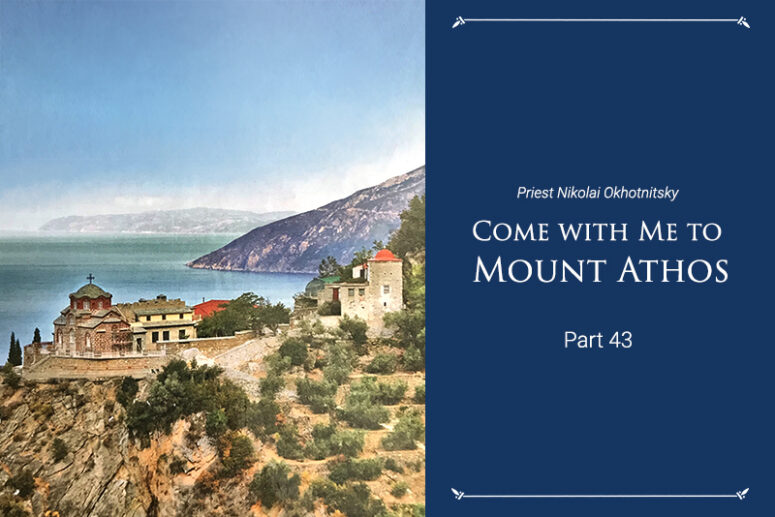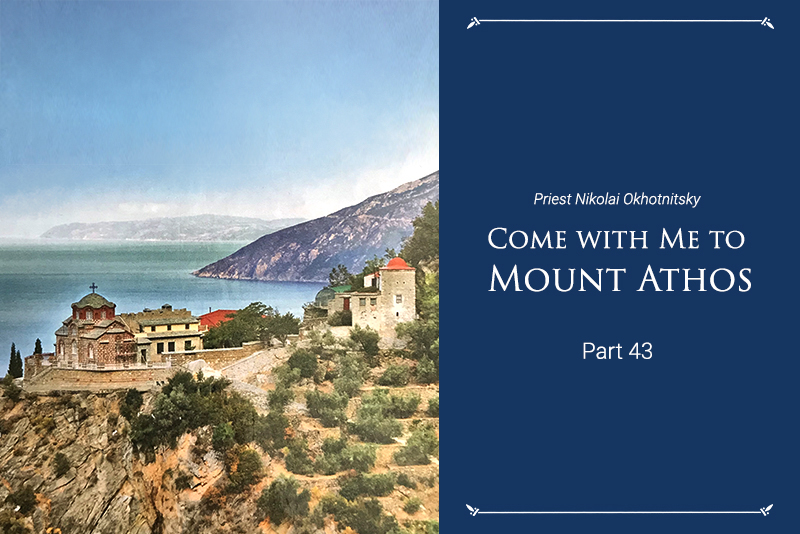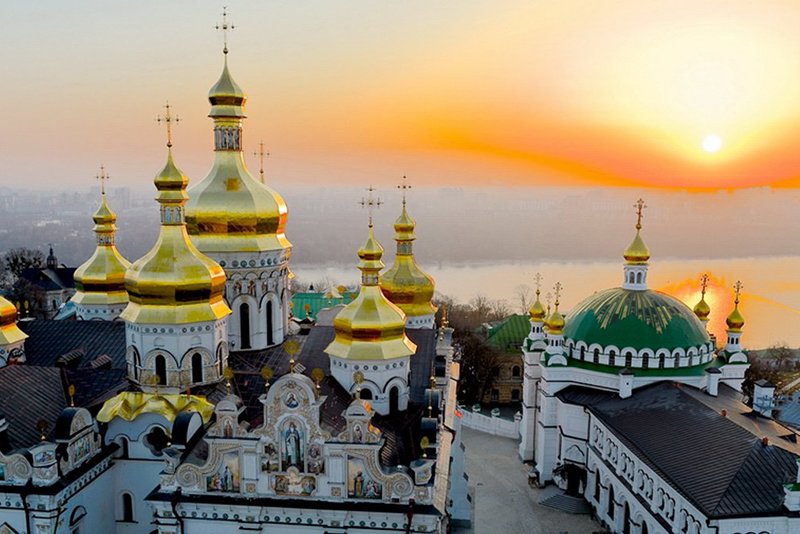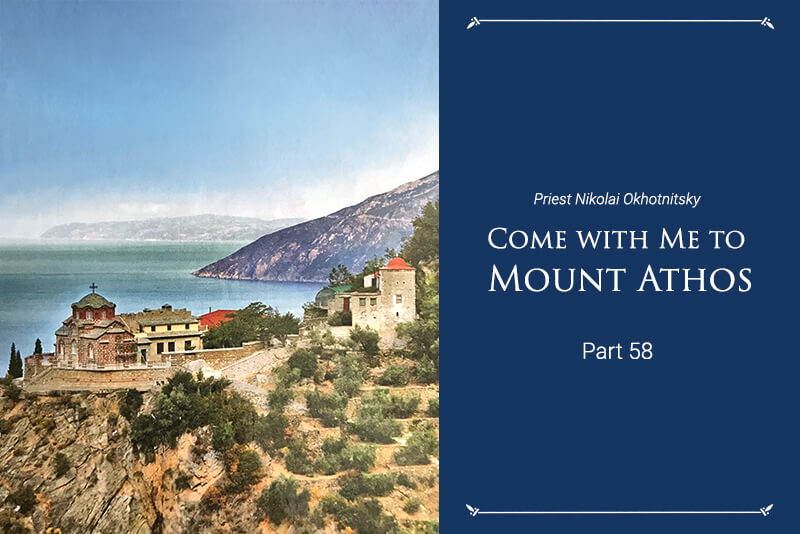
My Fine Dining and Drinking on Mount Athos
Entering the refectory of St Paul’s Monastery that morning, I tried to be a little more modest and instead of trying to sit separately, I joined a group of pilgrim monks from Russia. Before sitting down on the edge of the bench, I inquired politely:
– Mind if I join you, brothers?
– Please, have a seat!
The monk sitting closest to me moved over a little to offer me some more space.
– Thank you!
The literal translation of the churchly Russian “Thank you” is “May the Lord save you”. Unfortunately, we sometimes pronounce these and other wonderful words in surprising and unexpected forms. Imagine someone being late for Liturgy and trying to make his way to an icon to light a candle and say a prayer in front of it. He’d better watch out for that super-Orthodox babushka with a benevolent face and half-closed eyes. But what a nuisance, he disturbs her. It would be better for him to go to another church that day. Incinerating the wrongdoer with her gaze, the old lady whispers “God bless you, child” in a tone of voice resembling a rattlesnake”, leaving the poor guy longing for forgiveness.
Predictably, I did not get to sit there for too long. Father Hierodeacon approached me and asked me to move. I followed him. Today the abbot was sitting at a different table, facing the doors of the Cathedral in honor of the Presentation of the Lord. I was seated at the same table, on the left hand side of the abbot. Opposite was Father David, and next to me was a monk who had been reading and singing during the service. The appearance of this reader (or singer?) was as powerful as his voice. This tall man with a wide gray beard and strong hands looked mature enough to be an elder, yet still fit for military service. A true pillar of Orthodoxy.
We prayed. The abbot sat down, and everyone followed him. The meal began. The menu was festive and consisted of stewed vegetables, red tomatoes (splendid as ever), cheese and sweets wrapped in parchment paper. This dessert was made of something similar to nougat with nuts and shaped like truffle candy. That was not all. In front of each of us, there was a small (about 250 grams) jug with wine. It immediately felt like Sunday. I reached for my jug before the meal. Father David, sitting opposite, gave me a sign with his eyes. It meant, “Wait, it’s too early yet”. Nobody except him noticed my movement, while I smoothly reoriented my hand and took a piece of bread. But my goodness, was I embarrassed! All the time I was watching closely the “natives” at the monasteries that we visited, trying to follow their example during prayer, meals etc. However, this time I failed. I lowered my head and began consoling myself with food. In the meantime, the abbot rang his bell. I looked at Father David, and he nodded to me, like, “Now it’s time, brother. Chin-chin!”
I had heard from my writer friend that the Greeks dilute dry wine with water, considering those drinking it straight potential drunkards. I solemnly filled a half of my metal mug with wine and added the same amount of water from a pitcher. I was glad to show everyone that I knew how to abstain from harmful passions. The “pillar of Orthodoxy”, sitting next to me, poured himself a full mug of wine and began to reward himself for his vigilant work with undiluted pleasure. I looked around and noticed that I was the only one who diluted this nectar of the Athos vine. Taking a sip, I realized that I made another mistake. My fragrant and refined drink turned into sour rose water. Oh well, that was my experience after all.
Then everyone was given a piece of the panagia prosphoron. I pinched off a crumb, and wrapped the rest in a napkin, saving it for my son, together with the candy.
After the blessing, we slowly went to get ready. Entering the cell, I took off my beautiful monastic leather belt and, carrying it on double arms, solemnly handed it to our fellow traveler Nikolai.
Kolya, this is for you!
– ?!!
– Pray for me, the unworthy priest Nikolai, and my family. Nikolai held the belt, dumbfounded by surprise (oh, what a balm for my vanity).
– Thank you! I will pray for you all.
– Nikolai pulled out a small notebook from a plastic bag and wrote our names with the names of our relatives on a sheet of squared paper. My heart became even lighter. Vladimir Georgievich suggested that we left our gifts at St Paul’s Monastery, to console the brethren. We took out of our backpacks some sweets, dried biscuits, canned food, socks, and even mosquito repellent (which we didn’t seem to have any need for) and placed everything in a black bag.
I took upon myself the honorable mission of handing over the gifts to the brethren. Not finding any of our acquaintances, I gave the package to the first monastery dweller that I met. Monk Theodotos was pleasantly surprised. God bless you, brethren of the Monastery of St Paul!
Translated by The Catalogue of Good Deeds
Part 1
Part 2
Part 3
Part 4
Part 5
Part 6
Part 7
Part 8
Part 9
Part 10
Part 11
Part 12
Part 13
Part 14
Part 15
Part 16
Part 17
Part 18
Part 19
Part 20
Part 21
Part 22
Part 23
Part 24
Part 25
Part 26
Part 27
Part 28
Part 29
Part 30
Part 31
Part 32
Part 33
Part 34
Part 35
Part 36
Part 37
Part 38
Part 39
Part 40
Part 41
Part 42
Part 43
Part 44
Part 45




